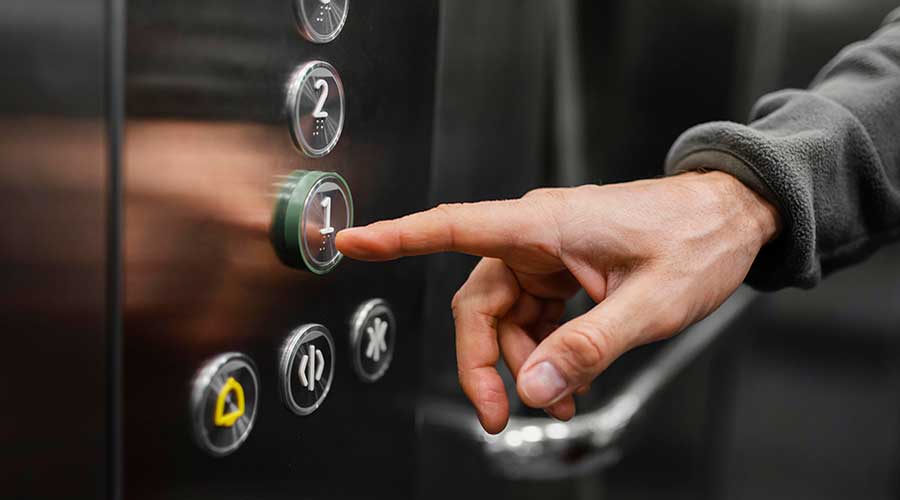The demand for new buildings has increased over the last few years, but space remains limited. Hospitals and other healthcare facilities have resorted to renovating or expanding current buildings. While tall facilities are attractive to the eye and can add to a city’s skyline, accessibility and safety can become issues.
Multi-story buildings need elevators in order to be accessible, and with them comes certain maintenance and safety protocols. It is essential that healthcare facilities managers budget for modernization efforts, and managers should budget and plan well in advance to ensure the safe and reliable operation of elevators.
“In hospital settings, patient safety is dependent on reliable and safe operation of not only medical equipment but also building systems, including elevators,” says Bruce L. Peterson, director of sales and commercial Strategy with Mitsubishi Electric US. Elevator/Escalator Division. “That’s why proper maintenance of these systems is especially important. The best way to ensure that your elevators are running safely, smoothly and reliably is through routine preventive maintenance, proactive parts replacement and modernization. These efforts reduce the risk of unexpected equipment downtime by addressing potential concerns and worn-out parts before they can grow into big problems.”
Preventive maintenance helps ensure that not only will equipment not shut down or malfunction but that the equipment operates as safely as possible. Hospitals and other healthcare facilities cannot shut down. Working with an elevator provider and scheduling regular maintenance increases reliability and safety.
“Imagine being a doctor trying to diagnose a patient without that patient’s health history,” says Kevin Robertson, executive vice president of sales, North America with TK Elevator. “Sure, the doctor can provide a diagnosis based on what they are seeing at that moment, but the accuracy of that diagnosis is likely improved ten-fold with the health history of that patient factored into their analysis. This also applies to an elevator. Its history must be properly documented to assist service technicians in the maintenance of elevator units.
“Today, that documentation is digitized, so instead of maintenance being performed when there’s an issue or failure, now the tech can predict when that elevator won’t be feeling well and proactively come onsite and replace a component at the end of its service life and keep that elevator healthy. Also, depending on the facility location, local (authority having jurisdiction) may require it per code.”
When considering upgrades, facilities managers should consider touchless technologies, which can play a critical role in passenger health and safety. The COVID-19 pandemic accelerated the development of this technology, which can be added with minimal disruption to service.
“The digitalization of the elevator industry is transforming facility management as buildings become smarter and more efficient,” Robertson says. “Although the elevator industry was one of the last ones to adopt and implement IoT, it has had a dramatic impact on building operations and efficiency. In addition, we are starting to see the inclusion of robotics elevator interfaces taking off in hospitals. Again, every second counts in hospitals, and these interfaces allow robots to operate an elevator like a human passenger and quickly deliver key medicine or medical supplies throughout a hospital. This includes calling the elevator and dispatching the robot to the correct floor, allowing seamless operation to deliver medicines to patients and eliminating the possibility of human error.”
Every second counts in a hospital or healthcare facility, and having to wait for a delayed elevator can be harmful to a patient or resident. It is imperative to have a proactive management plan in place to avoid an unscheduled downtime.
“Safety is the number one concern,” says Bruce Norden, vertical market business director service business for KONE Americas. “Any personnel servicing equipment needs specialized training and to ensure passenger safety and the person maintaining the equipment. Elevator companies have service programs that include highly trained technicians have the expertise, training, parts on hand. It is also imperative that any service partner have a 24/7 call center (records all calls) with trained call agents for any entrapments or safety issues and can mobilize support any day at any time.”
Mackenna Moralez is the associate editor of the facility market.

 UF Health Hospitals Rely on Green Globes to Realize Their Full Potential
UF Health Hospitals Rely on Green Globes to Realize Their Full Potential How Healthcare Facilities Can Be Truly Disaster-Resilient
How Healthcare Facilities Can Be Truly Disaster-Resilient TriasMD Breaks Ground on DISC Surgery Center for San Fernando Valley
TriasMD Breaks Ground on DISC Surgery Center for San Fernando Valley Bigfork Valley Hospital Falls Victim to Data Breach
Bigfork Valley Hospital Falls Victim to Data Breach AI-Driven Facilities: Strategic Planning and Cost Management
AI-Driven Facilities: Strategic Planning and Cost Management